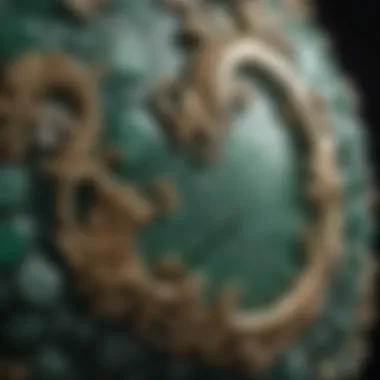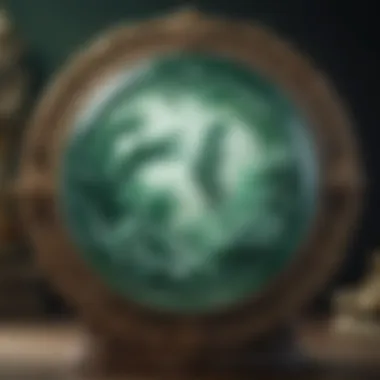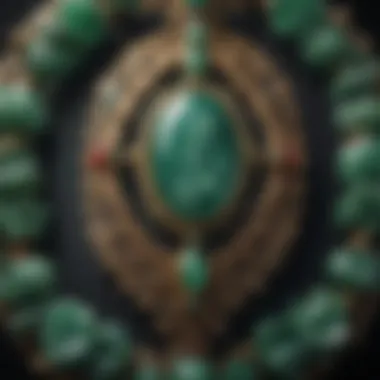Unveiling the Truth Behind Jade: An Extensive Guide for Authentication


Rock and Fossil Indentification
As we embark on the journey of deciphering the authenticity of jade, it is imperative to first delve into the realm of rock and fossil identification. Understanding the nuances of different types of rocks and fossils is crucial in distinguishing genuine jade from its imitations. One must pay careful attention to the specific characteristics that define real jade, such as color variations, translucency, and texture. Utilizing tools like magnifying glasses and UV lights can aid in the meticulous examination of these features to uncover the true identity of jade amidst a sea of counterfeits.
Collecting Tips and Techniques
For avid rock and fossil enthusiasts seeking to expand their collections with authentic jade specimens, mastering the art of collecting is paramount. Adopting best practices, such as obtaining specimens from reputable sources and documenting their geological origins, ensures the integrity of one's collection. Locating prime collecting sites known for yielding genuine jade boosts the chances of procuring authentic pieces. To safely extract specimens without causing damage or altering their natural state, gentle handling and the proper use of tools are essential.
Preservation and Display
Once an exquisite piece of jade has found its way into a collection, the focus shifts towards preservation and display. Employing techniques like cleaning with mild soap and water, avoiding harsh chemicals, and storing jade in a dry, controlled environment prolongs its beauty and longevity. Proper storage methods, such as using acid-free tissue paper or storing in velvet-lined cases, protect jade from scratches and scratches. Embracing creative display ideas, such as incorporating jade into aesthetic arrangements or showcasing it under specialized lighting, enhances the allure of these magnificent specimens.
Geological Insights
To truly appreciate the authenticity of jade, exploring its geological insights is essential. Unraveling the geological formations and processes that give rise to jade unveils its natural splendor and allure. Delving into the historical significance of jade throughout civilizations provides a profound understanding of its cultural value and symbolism. Reflecting on notable discoveries in the field of jade elucidates the ongoing fascination and intrigue that this precious gemstone evokes within the realms of geology and beyond.
Introduction
In the realm of precious stones and minerals, the authenticity of jade holds significant importance. For rock and fossil enthusiasts, distinguishing real jade from imitations is not just a matter of financial value but a reflection of their passion for genuine geological marvels. As we embark on this comprehensive journey through the intricacies of jade authentication, we delve into the very essence of what makes this stone a coveted treasure.
Understanding the Significance of Authenticity
The Rarity and Value of Genuine Jade
At the core of the authenticity debate lies the rarity and unparalleled value of genuine jade. Unlike its synthetic counterparts, genuine jade carries with it a history as ancient as the earth itself, embodying a mystique that captivates collectors worldwide. The distinctive allure of genuine jade originates from its scarcity in nature, making each piece a unique artistic creation sculpted by the forces of time and geology. Within the context of this article, understanding the rarity and value of genuine jade provides enthusiasts with a compass to navigate the vast seas of imitation stones, guiding them towards authentic acquisitions that enrich their collections.
Overview of Jade Types
Nephrite vs. Jadeite


An essential facet of deciphering jade authenticity lies in discerning between two primary varieties: nephrite and jadeite. Nephrite, with its subtle yet elegant appearance, has been prized for centuries for its intrinsic beauty and cultural significance. In contrast, the vibrant hues and translucency of jadeite add a dynamic dimension to jade objects, reflecting a modern preference for vivid colors in gemstone aesthetics. Despite their distinct characteristics, both nephrite and jadeite represent the epitome of elegance and sophistication, catering to diverse tastes in the realm of jade connoisseurs. By exploring the unique attributes of nephrite vs. jadeite, collectors gain a deeper appreciation for the multifaceted nature of this revered gemstone.
Why Authenticity Matters
Cultural and Historical Importance
Beyond its monetary value, the authenticity of jade holds profound cultural and historical implications. Throughout history, jade has been revered not just as a symbol of wealth but as a conduit for spiritual and healing energies. Its significance in various cultures transcends mere aesthetics, symbolizing virtues of integrity, courage, and wisdom. By ascertaining the authenticity of jade, collectors safeguard these cultural legacies and ensure the preservation of traditional art forms associated with this noble stone. Delving into the cultural and historical importance of authentic jade sheds light on its enduring relevance in a world captivated by its mystique and symbolism.
Physical Characteristics of Real Jade
The significance of understanding the physical characteristics of real jade cannot be overstated in the quest to validate the authenticity of this revered gemstone. In this meticulous exploration, we delve deep into the nuances of genuine jade features. Recognizing the distinct color, texture, and translucency of real jade plays a pivotal role in distinguishing it from synthetic or imitative counterparts. By focusing on these specific elements, one can gain invaluable insights into the world of jade authentication.
Color
Shades of Genuine Jade
Shades of genuine jade form a crucial aspect of its identity and allure. The spectrum of colors seen in authentic jade - from deep emerald greens to delicate lavender hues - encapsulates its natural beauty and rarity. Understanding the varied shades of genuine jade allows enthusiasts to appreciate the unique geological processes that have shaped each piece. The depth and intensity of color in real jade serve as a testament to its authenticity, making it a prized choice for discerning collectors and connoisseurs alike.
Texture
Smoothness and Consistency
The texture of jade, characterized by its smoothness and consistency, provides tactile clues to its genuineness. When running your fingers across real jade, you can feel a distinct velvety touch that sets it apart from synthetic materials. The consistent quality of texture in genuine jade reflects its formation over centuries, resulting in a cohesive and homogenous feel. This tactile experience not only enhances the aesthetic appeal of jade but also serves as a fundamental criterion for differentiating it from replicas or substitutes.
Translucency
The Light Test
Translucency is a key attribute tested through the light test, shedding light on the inner structure of jade. Real jade showcases varying levels of translucency, allowing light to penetrate and illuminate its depths. By subjecting jade to light, collectors can observe the play of colors and internal patterns, confirming its authentic nature. The light test not only reveals the inherent beauty of genuine jade but also underscores its unique optical properties that captivate enthusiasts. Embracing the subtle nuances of translucency in jade adds another dimension to the fascination surrounding this precious gemstone.


Assessing Jade Density
In the realm of authenticating jade, one critical aspect that holds immense significance is the assessment of jade density. Understanding the density of jade plays a vital role in distinguishing between genuine and imitation pieces, providing valuable insights for enthusiasts in the field of rock and fossil collection. This section will delve into the specifics surrounding jade density assessment, highlighting key elements that aid in the verification process.
Weight Comparison
Real vs. Fake Density
When it comes to differentiating between real and fake jade, the concept of density serves as a fundamental criterion. Real jade exhibits a distinctive weight characteristic that sets it apart from its counterfeit counterparts. By comparing the weight of a suspect piece to that of a known genuine specimen, collectors and enthusiasts can gain valuable insights into the authenticity of the jade under scrutiny. The density of authentic jade offers a unique advantage in the verification process, as its weight provides a tangible indicator of its genuine nature. Understanding the nuances of real vs fake density ensures a more informed approach to jade authentication, allowing individuals to make discerning judgments based on concrete measurements and scientific principles.
The Sound Test
Ping Test for Density
Another methodology employed in the assessment of jade density is the use of a sound test, commonly known as the ping test. By tapping the surface of a jade piece and listening to the resulting sound, enthusiasts can gain insight into the density of the material. This technique relies on the principle that authentic jade produces a clear, resonant ping when struck, indicative of its high density. Understanding the nuances of the ping test for density is crucial for collectors seeking to validate the authenticity of their jade specimens. While this method offers unique advantages in authenticity assessment, it is essential to remain aware of its limitations and potential variations that may impact the results obtained. By incorporating the ping test for density into their authentication practices, enthusiasts can refine their skills in distinguishing between genuine jade and synthetic replicas.
Recognizing Genuine Jade Patterns
Recognizing genuine jade patterns is a pivotal aspect of this exhaustive guide on deciphering the authenticity of jade. In the fascinating world of jade authentication, the ability to differentiate between natural patterns and artificial replicas holds immense significance. Understanding the unique characteristics of genuine jade patterns not only aids in identifying authentic pieces but also adds a layer of appreciation for the geological processes that shape this coveted gemstone.
Veins and Inclusions
Delving into the realm of veins and inclusions in jade unveils a realm of intricate details that serve as distinguishing features between natural patterns and artificial replicas. Natural patterns, characterized by organic formations within the jade, bear the hallmark of authenticity, showcasing the untamed beauty of nature's artistry. In contrast, artificial replicas often lack the nuanced intricacies and depth found in genuine jade, serving as telltale signs of imitation.
Natural Patterns vs. Artificial Replicas
In the context of deciphering genuine jade patterns, the comparison between natural patterns and artificial replicas sheds light on the essence of authenticity. Natural patterns, with their organic flow and irregularities, capture the essence of time and geological processes, reflecting the true nature of jade's formation. On the other hand, artificial replicas, while attempting to mimic these patterns, often fall short in replicating the natural intricacies and complexities that define genuine jade.
Emphasizing the importance of recognizing these distinct features lies in the ability to discern between authenticity and imitation accurately. By understanding the intricacies of natural patterns vs. artificial replicas, enthusiasts and collectors gain a profound appreciation for the craftsmanship and inherent beauty of authentic jade, elevating the experience of jade authentication to a realm of art and science.


Visual Inspection Techniques
Incorporating visual inspection techniques such as magnification for detail examination plays a crucial role in the meticulous process of authenticating jade. Detailed scrutiny through magnification enables collectors to explore the intricacies of veins, inclusions, and texture, unveiling hidden details that indicate the true nature of the jade specimen.
Magnification for Detail Examination
Magnification for detail examination magnifies the visual landscape of jade, unveiling hidden details and intricacies that are imperceptible to the naked eye. This technique allows collectors to scrutinize the patterns, texture, and inclusions of jade with precision, enabling a comprehensive assessment of authenticity.
Highlighting the significance of magnification for detail examination in jade authentication underscores the attention to detail required in distinguishing genuine jade from its synthetic counterparts. By immersing in the microscopic world of jade, enthusiasts embark on a journey of exploration and discovery, unlocking the secrets held within the intricate patterns and features of this revered gemstone.
Testing Techniques for Jade Verification
Testing techniques play a crucial role in the authentication process of jade. In this article, we delve into various methods used to verify the authenticity of jade, providing rock and fossil enthusiasts with the knowledge they need to make informed decisions. Understanding the intricacies of testing techniques is paramount when differentiating between genuine jade and imitation pieces. By exploring the specific elements that define these techniques, readers can gain a comprehensive understanding of how experts determine the authenticity of jade.
Hot Needle Test
The Hot Needle Test is a fundamental technique within the realm of jade verification, focusing on assessing the stone's reaction to heat. This test is instrumental in distinguishing between real and fake jade based on how each type responds to high temperatures. By understanding the nuances of assessing reaction to heat, individuals can uncover crucial insights into the authentic nature of the jade piece in question. The key characteristic of this test lies in its simplicity yet effectiveness, making it a popular choice among gemologists and enthusiasts alike. Despite its straightforward nature, the Hot Needle Test carries significant weight in the process of jade authentication due to its reliable results and practical application in the field.
UV Light Examination
Another indispensable tool for jade verification is the UV Light Examination, which aids in determining the authenticity of jade under ultraviolet light. This specific assessment method adds an extra layer of scrutiny, as certain properties of genuine jade are only revealed under UV light. Highlighting the fluorescence and unique reactions of authentic jade, the UV Light Examination offers important insights that complement other testing techniques. Its advantage lies in its ability to unveil hidden characteristics of jade, enhancing the overall authentication process. However, like any method, there are limitations and considerations to keep in mind regarding the dependence on UV light for confirming jade authenticity.
Density Calculation Methods
Understanding the specific gravity of jade is essential in its verification process, and density calculation methods provide a scientific approach to this assessment. By delving into the characteristics of jade related to its weight and density, gemologists can make accurate determinations regarding authenticity. The key advantage of using density calculation methods is the precision they offer in identifying real jade based on its physical properties. This detailed analysis facilitates a thorough examination of the specimen, ensuring that all aspects align with the expected attributes of genuine jade. However, it is vital to consider the limitations of density calculations and how they factor into the broader scope of jade verification.
Consulting Experts and Gemologists
When it comes to delving deep into the authenticity of jade, consulting experts and gemologists plays an integral role. These professionals bring a wealth of knowledge and experience to the table, offering valuable insights that can help in authenticating jade pieces effectively. By engaging with experts in the field, individuals can gain access to specialized expertise that may not be readily available to the average enthusiast.
Gemologists, in particular, are trained in the art of identifying and evaluating gemstones, including jade. Their expertise in gemology equips them with the necessary skills to discern the authenticity of jade based on specific characteristics such as color, texture, and translucency. Moreover, gemologists can provide detailed assessments using advanced tools and techniques that go beyond what a layperson might be able to accomplish.
Collaborating with gemologists and experts in the field also offers enthusiasts the opportunity to learn more about the history and cultural significance of jade. These professionals can share insights into the geological origins of jade, as well as the traditional uses and symbolic meanings associated with this precious stone.
In addition to their knowledge base, gemologists often have access to specialized equipment such as refractometers and microscopes, which can aid in the thorough examination of jade specimens. This level of precision and attention to detail is crucial when verifying the authenticity of jade, ensuring that enthusiasts can make informed decisions when adding to their collection.
Overall, consulting experts and gemologists provides a multifaceted approach to deciphering the authenticity of jade, adding layers of expertise and insight that enhance the process of identification and verification.







